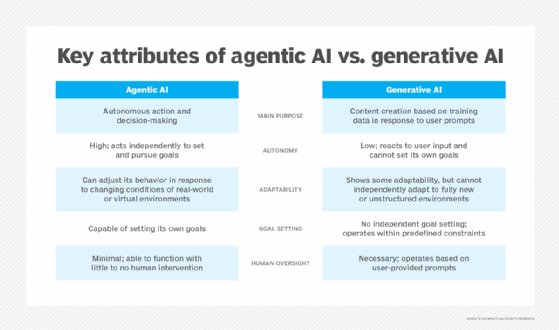What is agentic AI? Complete guide
Agentic AI refers to artificial intelligence systems that are capable of autonomous action and decision-making. These systems, often referred to as AI agents, can pursue goals independently, without direct human intervention. To do so, they use advanced techniques such as reinforcement learning and evolutionary algorithms to navigate ambiguous and novel environments.
An agentic AI system is designed to make decisions, handle complex situations and, in some cases, adjust its behavior autonomously. In the last case, the AI agent operates without human oversight, instead using algorithms and environmental data to optimize its behavior.
However, today, AI still generally operates with human-defined objectives; AI that can fully set and pursue its own goals remains theoretical. Although many of today's AI systems exhibit agentic behaviors, they are typically specialized for particular tasks and limited in scope for safety and usability reasons.
Although some narrow AI systems can adapt to new challenges in controlled environments, they are not intended for totally unstructured scenarios or designed to function on their own over the long term. Agentic general AI, capable of autonomous decision-making across a broader and more diverse range of tasks, does not currently exist. The pursuit of such capabilities has piqued both interest and concern among researchers, with many experts raising significant safety questions regarding potential risks.
How does agentic AI differ from traditional AI?
Traditional AI systems are designed to solve specific, predefined tasks, although many do display adaptability within that purview. Traditional AI includes everything from simple rule-based AI algorithms to complex systems, such as generative AI models like ChatGPT that rely on advanced natural language processing techniques. Traditional AI primarily responds to user input or environmental stimuli, and it lacks truly autonomous, goal-driven behavior.
In contrast, agentic AI systems are designed to take initiative in pursuing objectives. Rather than executing commands or routines set by humans, agentic AI systems are intended to adjust their strategies and explore their environments in real time.
This independent, goal-oriented behavior is what gives agentic AI its "agency." Traditional AI, by comparison, has task-specific boundaries and requires at least some human input and oversight. Agentic AI extends the scope of what AI can do, encompassing levels of reasoning, planning and autonomy that traditional AI -- even highly advanced forms of it -- can't match.
Agentic AI vs. generative AI and LLM chatbots
Agentic AI and generative AI differ mainly in their autonomy and scope. While both are sophisticated, their purpose, capabilities and degree of independence are different.
Generative AI tools, such as image generators and chatbots based on large language models (LLMs), create content in response to users' prompts. In this way, they are fundamentally reactive, although they can behave in seemingly proactive ways -- asking follow-up questions to continue a conversation, for example, or searching the internet to generate outputs. But generative AI is ultimately dependent on user input, and it is unable to set its own goals or reason independently.
Agentic AI systems, in contrast, are actively engaged in their tasks and environment. Unlike generative AI tools, they are not restricted to responding to user prompts. Even if agentic AI systems are guided by goals that humans initially define, they can act alone and are capable of free-form interactions with the real world, e.g., robotics, or with virtual environments, e.g., simulations.

Potential use cases for agentic AI
Agentic AI use cases span various domains and sectors, including consumer, research and enterprise applications. However, it's important to keep in mind that many of these capabilities are aspirational or only partially realized.
On the consumer side, current virtual assistants like Amazon's Alexa and Apple's Siri are primarily reactive to user input, but future versions with agentic features could have significantly broader capabilities. For example, a personal AI agent might eventually be able to autonomously reorder commonly used household supplies when stocks are low, or adjust a home thermostat in response to weather changes, taking into account a user's historical temperature preferences.
In gaming, reinforcement learning has already been explored to enhance nonplayer character (NPC) behavior, but agentic AI could take this further. Imagine future role-playing games where NPCs autonomously adapt their strategies and behaviors based on a player's actions and various in-game variables, making each playthrough unique and unpredictable.
In research, AI agents are already used to accelerate scientific discovery, particularly in tasks like hypothesis generation and simulations. For instance, AI systems in drug discovery can help identify promising drug candidates. However, these systems currently require human input for planning and validation. Fully autonomous AI agents capable of handling entire research processes independently are a long-term goal.
Agentic AI in the enterprise
Agentic AI has numerous potential applications in enterprise settings, including customer support, business process automation (BPA), supply chain management and manufacturing, and finance. The introduction of agentic AI to these use cases -- many of which are already partially automated -- would significantly minimize or even eliminate the need for human involvement. But again, while some agentic capabilities are starting to emerge in the enterprise, fully autonomous enterprise AI does not yet exist.
In customer service, an AI agent could go beyond a typical chatbot's capabilities. Instead of merely interpreting a customer's request to exchange a clothing item for a different size, it could autonomously generate a return label, place a replacement order and handle shipping logistics for the new item.
In BPA, AI agents could manage enterprise workflows and business processes that are tedious, time-consuming and prone to human error. For example, an AI agent might autonomously handle invoice processing from start to finish, which would reduce operational costs as well as improve efficiency and scalability.
In supply chain management and manufacturing, agentic AI could predict demand, optimize inventory and coordinate shipments, while dynamically responding to disruptions such as weather conditions or transportation delays.
In factory settings, adding agentic capabilities to manufacturing robots could further enhance their usefulness and ability to respond to unexpected scenarios -- for example, responding to anomalies on a conveyor belt, or optimizing their own production speed over time.
In finance, versions of agentic AI are already used in high-frequency trading. These systems can autonomously execute trades at high speeds and identify arbitrage opportunities that are too subtle for humans to detect, such as microsecond-level price differences across exchanges. But current systems are constrained by human-defined parameters, whereas a fully autonomous agent could independently analyze markets and develop new trading strategies on its own.
Pros and cons of agentic AI
Agentic AI offers a number of benefits, largely related to its ability to operate independently and adaptively. But full agentic AI remains theoretical, and even if achieved, it comes with risks and limitations.
Advantages of agentic AI
The main advantages of agentic AI include the following:
- Autonomy. The defining feature of agentic AI systems is their ability to function without constant human oversight. This autonomy would save time and manual effort in a wide range of use cases, but it would be especially beneficial for dangerous or large-scale scenarios, such as industrial automation, space exploration and deep-sea missions.
- Flexibility. AI agents' ability to adapt to changes in their environment likewise offers significant benefits in terms of time and labor savings. Because agentic AI systems dynamically change their behavior when their environment changes, they could handle new or ambiguous information without having to turn to a human for guidance.
- Problem-solving. With its planning, reasoning and goal-setting abilities, agentic AI could solve problems well beyond what traditional AI can handle. Teams of AI agents could even work together to address complex scenarios -- for example, collaborative efforts among several agentic robots to cover a particular area in a search-and-rescue mission.
- Creativity. Agentic AI could generate new insights and research ideas by analyzing data sets in ways that humans do not. AI creativity differs from human creativity in that it is driven by pattern recognition and extrapolation from data rather than abstract thought or intuition. This could produce unusual perspectives and experimental setups in areas such as scientific research and development.
- Time and labor efficiency. Together, the above benefits mean that AI agents could work much more quickly and efficiently than humans, improving productivity. Although AI systems make their own types of mistakes, they can reduce human error by automating repetitive tasks and ensuring consistency. Agentic AI systems could even self-optimize by analyzing their own behavior and taking steps to fine-tune their workflows.
Risks and drawbacks of agentic AI
Major risks and drawbacks of agentic AI include the following:
- Security risks. If hacked or compromised by malicious actors, agentic AI systems could pose serious threats. Highly autonomous AI systems introduce new security vulnerabilities due to their independent decision-making and lack of monitoring. A compromised AI agent could be manipulated to make harmful decisions in critical sectors such as infrastructure or defense. Additionally, agentic AI systems could be vulnerable to adversarial attacks, where small manipulations in data inputs lead to significant unintended outcomes.
- Unexpected problematic behavior. Even traditional AI behaves unpredictably or counterproductively sometimes; agentic AI's autonomy increases this risk. Because AI agents operate without real-time human oversight, they might carry out tasks in ways that their creators and users did not anticipate. Moreover, if a model's decision-making or goal-setting processes are not transparent, it would be difficult for humans to understand or reverse the problematic behavior.
- Energy and resource costs. Complex agentic AI systems that require extensive computational resources could consume significant amounts of energy, resulting in environmental damage and high operational costs. Although not every AI agent would necessarily require massive resources, and research is ongoing into more energy-efficient AI models, large-scale AI systems need substantial power and data. This leads to concerns about sustainability as AI's demand for energy and water grows.
- Ethical and social concerns. Agentic AI raises profound ethical and social questions. If an AI agent makes a decision that results in harm, determining responsibility can be difficult. Should the blame fall on the developers? The organization using the AI? The AI system itself? Another concern is bias; if agentic AI systems make decisions in areas like law enforcement or hiring, they could reflect any biases present in their training data, leading to unfair or discriminatory outcomes. Further, if agentic AI automates many tasks traditionally performed by humans, it could cause significant job displacement.
- Lack of human control. Reducing the need for human oversight increases efficiency, but it could also make it difficult for humans to monitor and stop system behavior in real time. Proposed safety measures such as kill switches aim to enable human operators to stop agentic AI systems, but developing such mechanisms will be complicated. And while this is a speculative concern, some AI researchers worry that autonomous AI agents could develop goals misaligned with human values, posing a threat to humanity.







